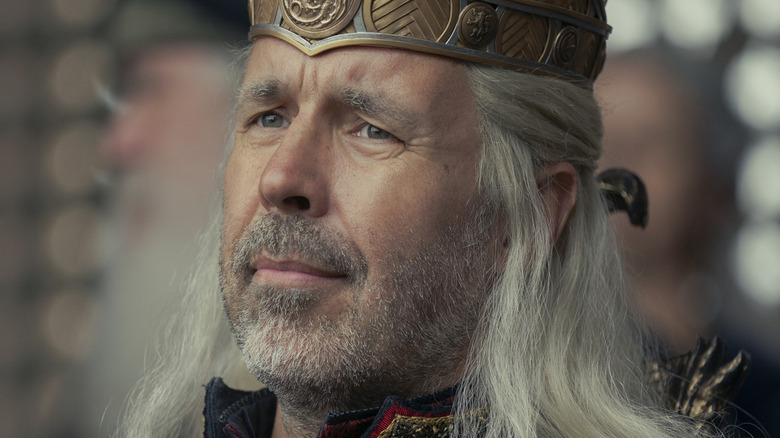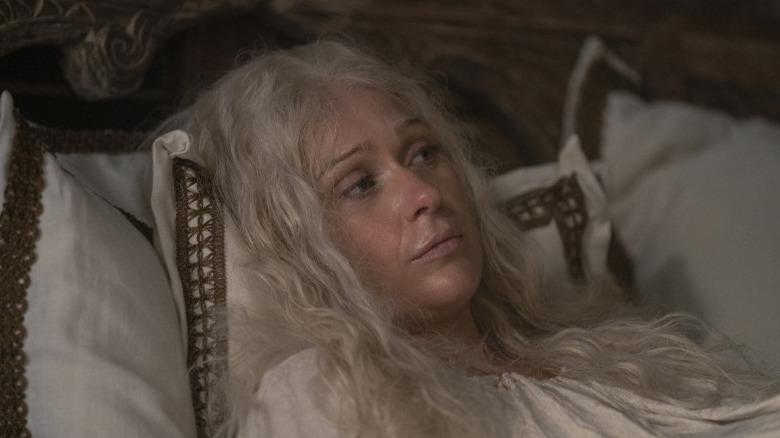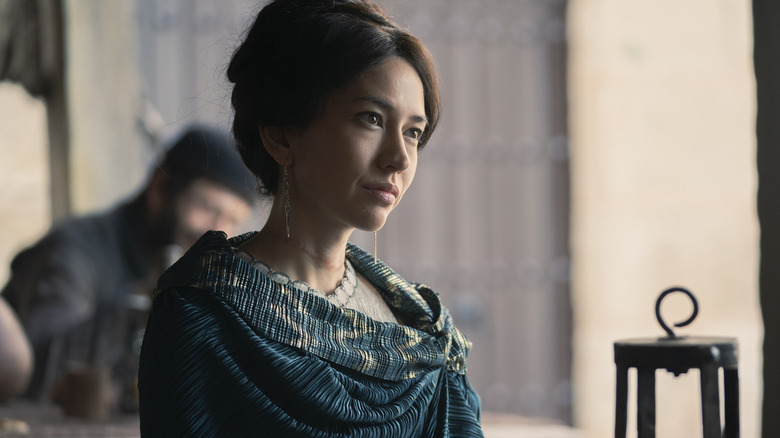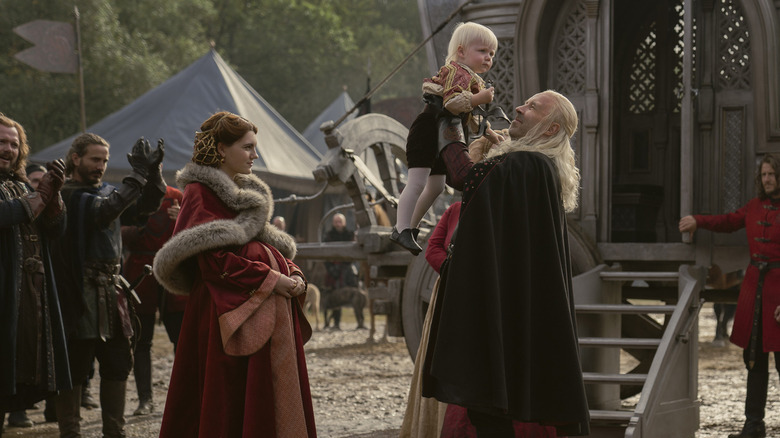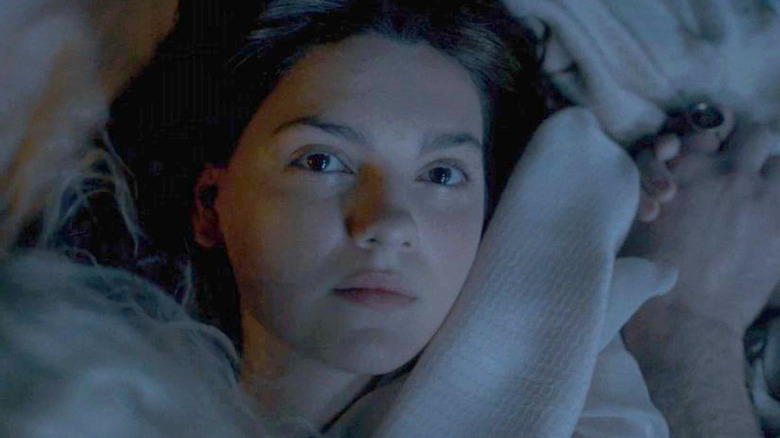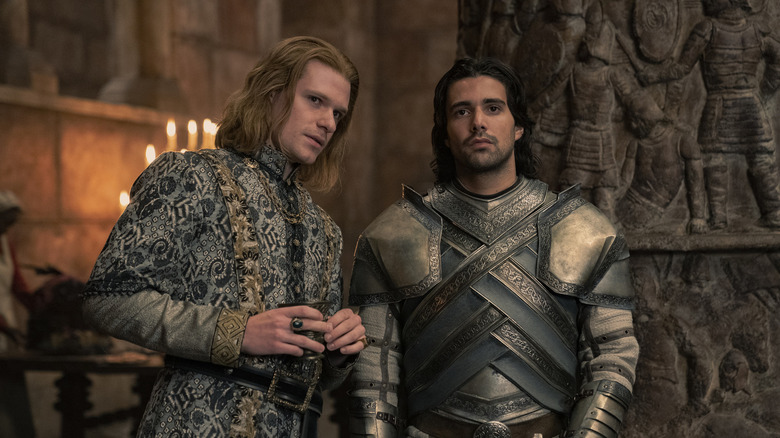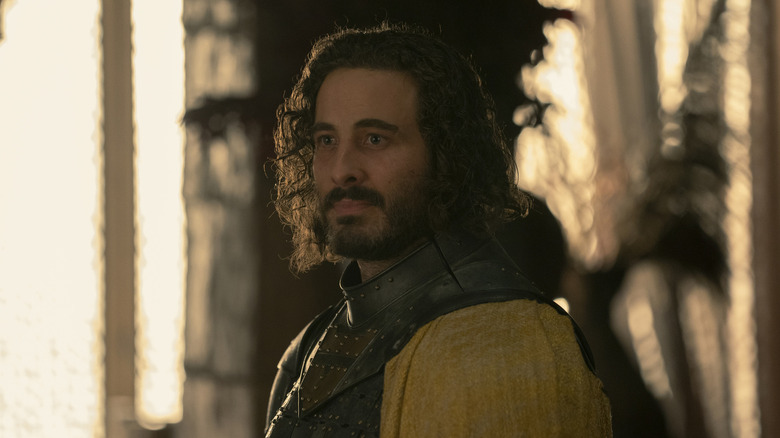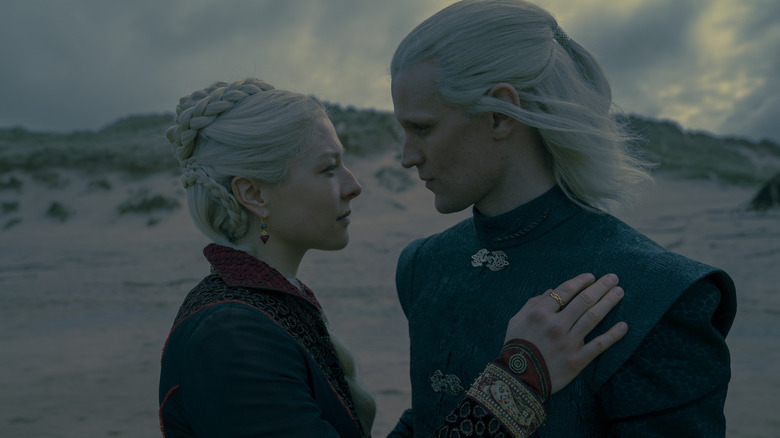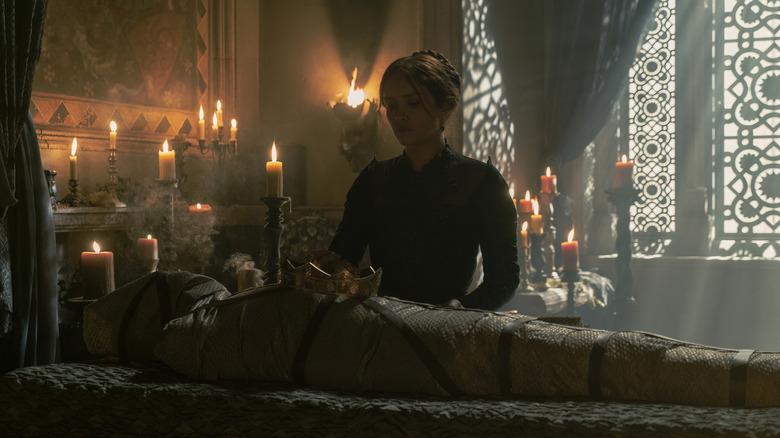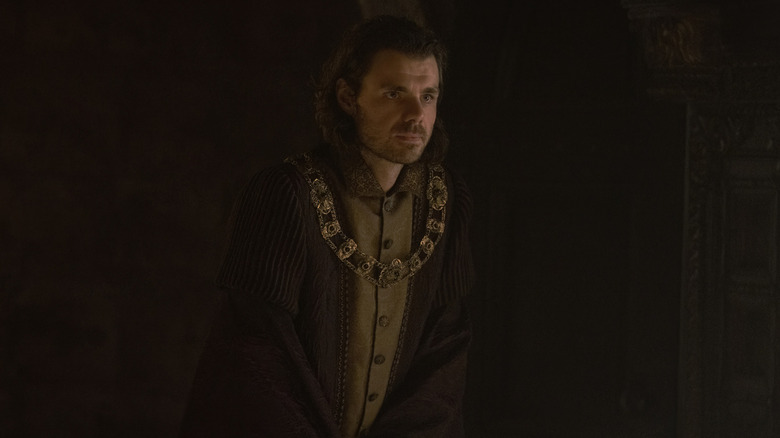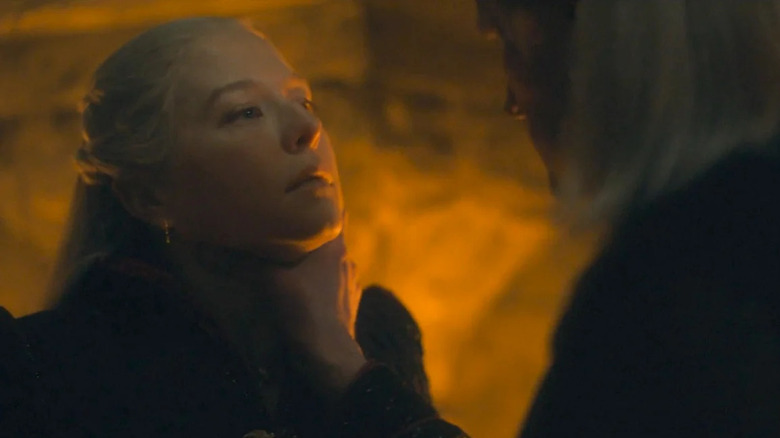House Of The Dragon Season 1 Moments That Really Upset Fans The Most
The "Game of Thrones" series finale was notoriously disappointing to the show's massive fanbase, so HBO took a real risk by revisiting Westeros in the prequel series "House of the Dragon." That risk appears to have paid off: The show debuted to impressive ratings, according to The Hollywood Reporter, and has already been renewed for Season 2. But that doesn't mean fans — including readers of "Fire & Blood," the book upon which it's based — are without complaint.
For the most part, "House of the Dragon" has done an admirable job adapting its fast-moving source material. It boasts astounding performances and sharp, multi-layered writing, plus gorgeously detailed production design. Moreover, unlike "Game of Thrones," "House of the Dragon" pulls from a story that has already been completed. This means viewers can rest assured, knowing these showrunners grasp where everything's going. Still, any time a movie or TV series borrows from an existing intellectual property, fans of the IP are bound to have some squabbles with how it's handled. George R. R. Martin's stories are also morally ambiguous and frequently difficult to stomach in their depictions of sex and violence, which makes for even more controversy.
Occasionally, the grisly deaths and exploitation are simply too much for the series' fans to stomach. In other instances, viewers are confounded by production choices that either stray too far from the text or just don't work in the context of the show. From sudden violence to shocking decisions, there are the moments from "House of the Dragon" Season 1 that upset fans the most.
Queen Aemma dies in childbirth
Episode 1 of "House of the Dragon," "The Heirs of the Dragon," revolves around a tournament heralding the birth of the new prince. Viserys is sure it'll be a boy, while Queen Aemma just wants an end to her miserable pregnancy. As her contractions begin, she pleads with Viserys not to make her go through this again, and the audience learns Aemma has had multiple miscarriages and stillbirths.
Her delivery is intercut with the tourney. The knights smash each other's faces, but the real horror unfolds in Aemma's bedroom. As the baby is in the breech position, the maesters tell Viserys that they cannot save Aemma, but they may yet save the child. It's upsetting enough that Viserys is given this control over Aemma's body — it's worse still that Viserys cannot bring himself to tell her the truth. He consents to the brutal procedure, and Aemma is put through excruciating pain and panic as the maesters not-so-carefully cut her open and remove the infant from her womb. She dies that night, and baby Baelon perishes before the day is through.
Book readers knew what was coming, but because "Fire & Blood" is written in the style of a historical text penned by male authors, the visceral reality of Aemma's labor and death are glossed over. Some viewers felt the episode should've had a trigger warning, and many lamented that the "Game of Thrones" universe was still torturing and disposing of women for shock value.
Mysaria's accent
We meet Daemon's mistress, Mysaria, in "The Heirs of the Dragon," then get to know her better in Episode 2, "The Rogue Prince." Daemon steals a dragon egg and takes off for Dragonstone with the supposedly pregnant Mysaria on Caraxes' back. He has some of his Gold Cloaks present to help him defend the castle, while Otto and the Kingsguard arrive to negotiate his surrender. But Rhaenyra and Syrax have everything under control. She lands her dragon, de-escalates the situation with Daemon, and recovers the egg. It turns out that Mysaria isn't really with child, and she's not happy to have been put in this vulnerable position.
Viewers didn't take umbrage with this narrative — they just couldn't wrap their heads around Mysaria's accent. As "Fire & Blood" details, Mysaria is a dancer from Lys who's smarter and more capable than most people assume. This is impressive, but the show's choice of accent exoticizes her, makes her seem a bit out of step, and is simply difficult to understand. Moreover, no other characters from this region of Martin's world sound like Mysaria.
It would be one thing if this was how Mysaria's actress, Sonoya Mizuno, spoke in real life. But Mizuno was raised in Somerset, England, according to The Herald. Mysaria's an intriguing character in "Fire & Blood," but her voice on "House of the Dragon" makes her a frustrating distraction viewers aren't happy with.
Otto tries to marry off a toddler
Otto Hightower is arguably Season 1's chief villain. He does a multitude of despicable things over the course of these 10 episodes, all because he wants someone from his bloodline on the Iron Throne. As if pimping out his daughter and overthrowing a regime weren't bad enough, the Hand of the King takes things even further in Episode 3, "Second of his Name."
As soon as Alicent gives birth to little Aegon, Otto begins scheming to get his grandson crowned. This episode follows a hunt held to celebrate the boy's second birthday. The Hand seizes this opportunity to sway Viserys with tradition and symbols, but when he doesn't seem to be getting anywhere, he changes tactics. Princess Rhaenyra is still in need of a husband, having turned down all suitors on her tour as well as Jason Lannister at the start of the hunt. When Viserys vents about the political problems this presents, Otto suggests that perhaps the two-year-old Prince Aegon and the 18-year-old Princess Rhaenyra could marry each other. The Targaryen king, with his long family history of incest, balks at the ridiculousness of this idea.
While the union of Rhaenyra and Aegon II could've spared countless lives, just the thought is enough to upset many fans, who expressed their disgust on Twitter. Besides, even though he's 16 years her junior, we wouldn't want to inflict Aegon's depravity and abuse on poor Rhaenyra.
Viserys summons Alicent to his bedchamber
Episode 4 of "House of the Dragon," "King of the Narrow Sea," is among the most salacious hours of television set in Westeros so far. Rhaenyra very nearly hooks up with her uncle Daemon before she coerces her employee and sworn protector, Ser Criston Cole, into bed. Then, she swears on her dead mother that what we just saw happen didn't really happen. But for all Rhaenyra's wildness, viewers found another sex scene harder to sit through.
Alicent is settling in for the night when a servant interrupts her peace. "Pardon me, your Grace," she says timidly, "the king has requested your presence." "The hour is quite late," Alicent responds. But this is an order and not an offer. As Rhaenyra is enjoying sowing her oats, Alicent is still and expressionless underneath the king, who is, as fans pointed out, visibly ill. "Game of Thrones" controversially stages sexual assaults and gratuitous shots of women's naked bodies, but this scene is something different. It shows how even the queen of the Seven Kingdoms doesn't rule her own body.
Earlier in the episode, Rhaenyra offends her former friend by sarcastically declaring, "How romantic it must be to get imprisoned in a castle and made to squeeze out heirs." This is just one element of the widening rift between Rhaenyra and Alicent over matters of procreation, but it's one of the most visceral.
Ser Criston pummels Ser Joffrey
Otto Hightower might be the force behind the Greens' treachery, but Ser Criston Cole — who carries most of this treachery out — might go down as the most hated character on "House of the Dragon." After their dalliance, Criston asks Rhaenyra to run away with him. She refuses, but doesn't exactly reject him, merely explaining she must fulfill her duties as heir. It soon becomes clear that Criston never really loved Rhaenyra. He's an insecure and possessive hypocrite with the shortest-ever fuse and the longest-ever grudges, which makes fans absolutely loathe him.
At the feast to kick off Rhaenyra's wedding to Laenor Velaryon, the groom's not-entirely-secret boyfriend, Joffrey, susses out that the princess and her sworn protector must be sleeping together. Joffrey doesn't realize their relationship is past tense, so when he approaches Ser Criston to form an alliance, he's tragically unprepared for the knight's extreme overreaction. Criston knocks Joffrey to the floor, then beats him until his face is pulverized beyond recognition. Gallingly, he never faces any consequences.
We don't know what, precisely, Criston's motivation is. He might be worried word of his broken vows will get out, or perhaps he's simply spiteful. Whatever the reason, fans find this vicious murder abominable. Joffrey is killed shortly after being introduced, and he and Laenor appear to have a healthy, loving partnership. To many, including The Advocate, Joffrey's murder feels like a particularly egregious example of media's tendency to kill off gay characters.
Harwin and Rhaenyra's brief affair
Healthy relationships are rare in Westeros. This means that when fans miss an opportunity to see one unfold, they get upset. Harwin Strong doesn't get many lines prior to Episode 6, "The Princess and the Queen." Non-book readers may have entirely missed him admiring Rhaenyra at the hunt or bumping into her on the Street of Silk. But after the 10-year time jump, we can tell from pretty obvious context clues that Harwin and Rhaenyra are very fond of each other and have had a relationship for most of the previous decade. He's the real father of her three boys, and is as doting a family man as he can be under the circumstances.
As he tells his own father in response to rumors, "You have your honor and I have mine." That honor compels him to defend Rhaenyra and her sons against Criston and his insults by way of a good, strong punch. Unfortunately, this costs him his job, and, soon after, his life. When they say their goodbyes, he and Rhaenyra make eyes at each other, but alas, "Breakbones," as he's known, must leave the princess and princes without so much as a goodbye kiss. This irritated fans, who might have liked a positive scene of physical contact after so many portrayals of assault and abuse. Failing that, fans of Harwin just wish he could've stuck around a little longer.
Driftmark is too dark
Episode 7 of Season 1, "Driftmark," sent fans into a tizzy. But they weren't upset by violence or cruelty — they were bothered by the lighting. "Driftmark" opens with Laena's twilit funeral. After the sun goes down, Daemon and Rhaenyra consummate their 15 years of flirtation on the beach, while Aemond sneaks out to test drive Vhagar. In the aftermath, Aemond instigates a brawl and loses an eye.
After the credits rolled, "House of the Dragon" fans immediately complained that they couldn't see what was going on, due to the episode's extremely dim lighting. Many compared the installment to the infamous Season 8 "Game of Thrones" episode "The Long Night." The long-awaited Battle of Winterfell underwhelmed audiences, despite its record-breaking length and scale, because everything was so darn dark. When fans expressed their outrage that this could have happened again with "Driftmark," the show defended the lighting as a purposeful artistic choice, as reported by Variety.
Since "House of the Dragon" takes place in a world without electricity, a certain dimness is understandable. But many fans believe this fealty to authenticity interrupts basic storytelling. Maybe the show will prioritize brightness and contrast over strict realism next time — or maybe fans just have to get used to a darkened screen.
Viserys' final words
While Daemon, Criston, and even Otto age well from episode to episode, King Viserys looks more and more worse for the wear. But to everyone's surprise, he becomes his most heroic when he's at his most decrepit in Episode 8, "The Lord of the Tides." George R. R. Martin even told actor Paddy Considine that he prefers his take on the character to his own, comparing Considine's Viserys to King Lear. Fans agreed, championing Viserys' last stand for his daughter and lamenting his final family dinner. Then comes the misunderstanding to end all misunderstandings.
With his final breath, the withered king thinks he's continuing a life-or-death conversation with his daughter, when really, he's talking to his wife. He means to tell Rhaenyra that he believes in Aegon's dream, and, what's more, he believes the Prince Who Was Promised will come from her line. But Alicent wrongfully interprets these phrases to mean that he wants their son Aegon to succeed him. Instead of setting things right, Viserys messes everything up, just when he was finally ruling the realm and his family with strength and solidity. Book readers were particularly taken aback by this development. In "Fire & Blood," Otto and Alicent usurp the throne just because they want to. This show-invented ending completely changes the reason the Dance of the Dragons starts at all, which many fans find unnecessary and frustrating.
Larys exploits Alicent
The drama that's been building up all season comes to a head in Episode 9, "The Green Council," when the Greens seize power. It takes a lot of objectionable behavior to pull off this coup. Criston brutally kills Lord Beesbury during a small council meeting. Otto seeks to assassinate the other half of Viserys' family. The servants are imprisoned, and Rhaenys is kept captive in her room. We find out that Aegon II not only has myriad bastards running around Flea Bottom, he spends his spare time at child fighting pits. Oh, and Meleys kills hundreds of commoners while escaping the Dragonpit.
But what really upsets viewers is the price Larys puts on his information. Alicent's personal Master of Whisperers approaches her with some intel concerning her father. Before he spills the beans, he wants something in return. Alicent takes off her shoes. When that doesn't produce the desired result, she removes her stockings. This all happens without a word being spoken between them, which is proof enough that it's happened before. She turns her head as Larys enjoys the sight of her naked feet.
Larys is exploiting Alicent, and Alicent knows it — but there's nothing she can do. This squirmy scene is vintage "Game of Thrones": It's out of left field, gross, and meant to shock us. Indeed, fans couldn't stop talking about this moment after "The Green Council" aired. Even diehard Rhaenyra fans can't help but feel for the queen in this moment.
Daemon chokes Rhaenyra
Twins Jaime and Cersei Lannisters' long-term relationship is at the heart of their dysfunction on "Game of Thrones." But both the creators and fans of "House of the Dragon" are more on board with Daemon and Rhaenyra's romance, though they're uncle and niece. Maybe the fact that it's a Targaryen tradition makes them okay with it. Maybe it's just that Matt Smith has chemistry with everybody. Maybe it's that once they exchange their very particular marriage vows, Daemon and Rhaenyra seem pretty happy together. Whatever the reason, Season 1 got many to root for this uncommon couple.
So viewers were understandably shaken by the moment Daemon grabs his wife by the throat in Episode 10, "The Black Queen." Rhaenyra is considering Alicent's terms. She feels Viserys tasked her with preparing for the coming war in the North and holding the realm together; whether she sits on the Iron Throne while doing that is of less consequence. She confides this in Daemon, thinking he's been let in on the secret of Aegon's dream. But he hasn't. Daemon seems to become enraged by the thought that Rhaenyra might be a cautious and omen-savvy ruler, like her father was. He grows even angrier when he realizes Viserys didn't trust him with this information. In a vicious moment, he chokes Rhaenyra and warns her to avoid following in Viserys' footsteps.
Though we've seen Daemon react impulsively on several occasions, many viewers felt this abuse was out of character. Notably, this scene doesn't occur in "Fire & Blood." Daemon isn't a hero and isn't even a good husband to Rhaenyra in the book, but this moment still felt like a bridge too far to plenty of fans.
